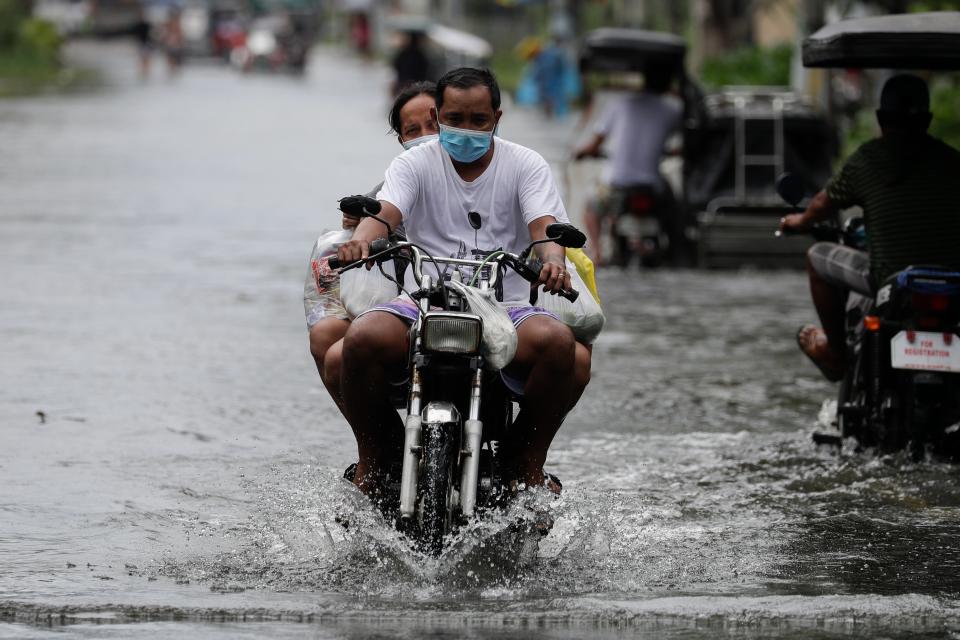Could the foreign aid budget cut harm UK’s efforts to lead the world on climate crisis?

Philippines Asia Typhoon
(Copyright 2020 The Associated Press. All rights reserved.)In his spending plans announced on Wednesday afternoon, the chancellor Rishi Sunak slashed the foreign aid budget from 0.7 to 0.5 per cent of the national income – a move that both defied his own party’s manifesto pledge and the warnings of five former British prime ministers.
The announcement sparked condemnation from a wide range of figures, including foreign minister Baroness Liz Sugg, who resigned in protest. In her letter to the prime minister, she said: “Cutting UK aid risks undermining your efforts to promote a Global Britain and will diminish our power to influence other nations to do what is right.”
Her words come as the UK prepares for its Climate Ambition Summit. It will be held on 12 December, the five-year anniversary of when a deal was reached by countries for the Paris Agreement on climate change.
The summit is a “kick-off event” aimed at inspiring greater ambition on climate action ahead of the upcoming UN climate talks, which will be hosted by the UK in Glasgow in 2021.
“Ahead of next month’s Climate Ambition Summit, I’m calling on my fellow leaders at the G20 to make bold pledges and harness our collective ingenuity and resources to defeat the pandemic and protect our planet and our future for generations,” said the prime minister in his statement to the G20 summit held last weekend.
But the cut to the foreign aid budget could put the government on the “back foot”, says Nick Mabey, chief executive and founder of E3G, a climate change think tank.
“The cut to aid puts UK climate diplomacy on the back foot just as the prime minister prepares the kick-off summit for Cop26 on 12 December,” he told The Independent.
Sadly I have resigned from Government today. Here’s my letter to the PM👇 pic.twitter.com/hWwPtBuH6v
— Baroness Sugg (@liz_sugg) November 25, 2020
“The UK is already struggling to get other donor countries to meet their climate finance commitments to help poor countries, and this announcement will remove any remaining ability to apply pressure.”
Under the Paris Agreement, both developed and low- and middle-income countries pledged to slash their greenhouse gas emissions in order to keep global warming below 2C above pre-industrial levels.
However, the pledges from poorer countries were made on the condition that they would receive financial support from richer nations. (This reflects the fact that, since the start of the industrial era to today, richer nations have been responsible for the majority of greenhouse gas emissions.)
Richer countries have pledged to mobilise $100bn of “climate finance” for poorer nations by 2020. However, a report released a few weeks ago by the Organization for Economic Co-operation and Development (OECD) found that, by 2018, they were still some way from meeting that figure. The total amount of climate finance given in 2018 was $78.9bn, up 11 per cent on the previous year.
Though it appears that climate finance is protected in the government’s new spending plans, there are fears that slashing overseas aid could harm the UK’s efforts to encourage other developed nations to increase their spending on climate finance.
Defenders of the government’s decision will point out, however, that, for the last few years, the UK has been the only G7 country to meet the 0.7 per cent foreign aid spending target.
But there are further worries that any move to cut overseas funding could alienate developing countries – right at the time when the UK is aiming to work with them to boost ambition to tackle the climate crisis.
“If developing countries feel they have been abandoned to manage the impact of Covid and climate change on their own, despite having caused neither problem, then a harsh backlash is on the cards,” said Mr Mabey.
“If others follow the UK in slashing aid, then Cop26 risks being an angry north-south argument about funding to help countries survive climate impacts rather than a global celebration of rising climate ambition and cooperation.”
In a time when #LDCs need support more than ever, #ODAfunding cuts take us in the wrong direction. With global problems of #COVID & #climatechange, we need more solidarity - not less. As @COP26 President, we call on the UK to lead, not retreat @hmtreasury @FCDOGovUK
— LDC Chair (@LDCChairUNFCCC) November 24, 2020
Before the chancellor made his announcement, Sonam Phuntsho Wangdi, chair of a group of the 50 least-developed countries (LDCs) at the UN climate talks, said in a tweet that a cut to overseas aid would take the world in “the wrong direction”.
He said: “In a time when #LDCs need support more than ever, #ODAfunding cuts take us in the wrong direction. With global problems of #COVID & #climatechange, we need more solidarity – not less. As @COP26 President, we call on the UK to lead, not retreat.”
A government spokesperson said: “The UK will spend £10bn on overseas aid next year – making it one of the highest donors in the G7 – and we intend to return to 0.7 per cent as soon as the fiscal situation allows.
“Overseas aid is just one of the ways we play our role in the world and the prime minister has committed at least £11.6bn over the next five years to support developing countries manage the transition to net zero, as we prepare for Cop26.”
Read More
Firefighters on ‘frontlines of climate crisis’ without enough support

 Yahoo Finance
Yahoo Finance 